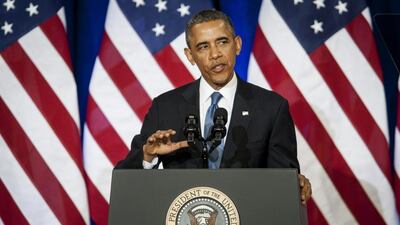WASHINGTON // The US government will end its mass collection of American phone data, President Barack Obama said on Friday in a speech announcing the most significant curtailment of US surveillance practices in more than a decade.
The most immediate changes to spy operations affect a National Security Agency (NSA) programme that collects data on nearly all US phone calls. Under the new presidential directive, intelligence officials are now required to obtain an order from a secret national-security court for government searches of phone data, and the scope of individual searches has been scaled back.
“The reforms I’m proposing today should give the American people greater confidence that their rights are being protected, even as our intelligence and law-enforcement agencies maintain the tools they need to keep us safe,” Mr Obama said. “I recognise that there are additional issues that require further debate.”
Mr Obama also adopted new protections for non-US citizens and put an end to spying on the heads of state of close US allies, although monitoring directed at leaders’ staff members was not prohibited.
The reforms follow months of highly sensitive leaks by a former government contractor, Edward Snowden, about secret US spying practices that have embarrassed the White House and sapped Americans’ trust in the president.
With his announcement, in a speech at the Justice Department, Mr Obama also set the stage for a clash with intelligence officials as well as their allies in Congress and elsewhere.
The changes, while more sweeping than anticipated, leave some key surveillance practices untouched. Among them are other mass data-collection programmes that operate under the same authority as the NSA phone-data programme, including a Central Intelligence Agency programme that collects data on international money transfers from companies such as Western Union, which includes records of millions of Americans.
But the overall effect of the changes unveiled by Mr Obama imposes sweeping new requirements that US spy programmes satisfy privacy and civil-liberties objections.
“He recognises the concerns that have been raised about the potential for abuse when the government is in the business of collecting these volumes of information,” said a senior official.
In his speech, Mr Obama issued a directive that outlined new rules for NSA surveillance practices both at home and overseas.
Mr Obama said the NSA phone-data programme would be housed outside of the government, but did not specify an alternative location. Instead, he asked the attorney general, the NSA, and other spy agency leaders to work with Congress to devise one and report to the president within 60 days.
He also opened the door to further changes to the NSA’s mass monitoring of foreign targets, which collects vast amounts of American data “incidentally”.
The changes to US surveillance programmes are part of Mr Obama’s broader re-examination of post-September 11 security practices. The reviews of the use of armed drones; the closing of the detention centre in Guantanamo Bay; and now US surveillance programmes are designed to restructure terrorism policies and shore up their credibility before Mr Obama leaves office, White House officials say.
The next policy to come under similar review is the 2001 Authorisation for Use of Military Force, a senior administration official said, referring to the congressional act that provided the basis of a campaign widely known as the “war on terror”.
Mr Obama’s speech was highly anticipated by a range of audiences, including legislators, intelligence officers, foreign leaders, civil-liberties advocates, technology companies and the broader American public. Each has a major stake in new rules of the road for US surveillance.
Legislators in both parties are deeply divided over whether surveillance operations should be significantly curtailed. Some of Mr Obama’s announcements on Friday put him at odds with his own Democratic Party, as well as his traditional Republican adversaries.
Mr Obama had long intended to review US surveillance practices, administration officials said, but the process was hastened by leaks of classified information by Mr. Snowden, who is now a fugitive living in Moscow.
The location of the phone data has come under the most intense debate. Mr Obama’s handpicked review panel, which gave him its recommendations last month, proposed that phone data be stored someplace other than with the NSA. The panel also recommended that investigators be required to get a judge’s order to do a search of that data.
Telecommunications companies and the NSA have made the case to Mr Obama that relocation would be technically difficult, while many privacy advocates do not think changing the location of the data would enhance privacy protections.
Requiring a judge’s order for searches will appeal to many privacy advocates, but intelligence leaders have said such a change is needless, cumbersome and will slow investigations.
* Dow Jones Newswires

